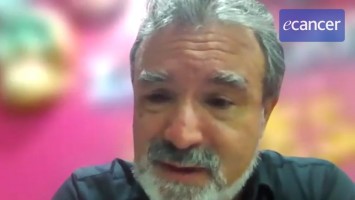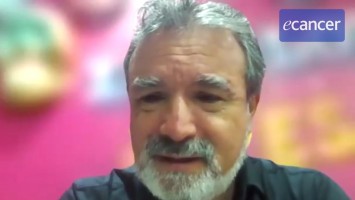SIOG 2013
Evaluating and screening geriatric patients for treatment
Dr Martine Extermann - Moffitt Cancer Center, Tampa Bay, USA
One of the key questions of geriatric oncology is how can we use all the work that geriatricians have done over the years in general geriatrics and apply that to the field of oncology? A quarter to a third of us are going to develop a cancer throughout our life and half of the time it’s going to be after the age of 70. So many of us will have other health problems by the time we have a cancer but not all and you can have some very healthy older persons. Senator Glenn, when he was on the space shuttle, was 77 and was able to do what an astronaut does, that’s not your typical older person; you have other people for whom going to the bathroom is a space expedition. So you have the whole spectrum and, as cancer physicians, we give treatments that are pretty aggressive sometimes so you have to know which person can have that treatment and get the full benefit of it and which person cannot have the treatment.
Therefore we have been promoting at SIOG, for disclosure I am a past President of SIOG, but we have been doing taskforce work in order to review the evidence and see how is the best way to evaluate these cancer patients with geriatric instruments. We advocate a two-step approach; oncologists are very busy people, not everybody above 70 needs a whole assessment by a geriatrician, it can take quite a bit of time to have that assessment by your geriatrician, and so we advocate to first do a short screening tool and then refer the patient who is screen positive for a full geriatric assessment. The idea is that an oncologist, even in private practice when you are very busy, when you see a patient for the first time it’s going to be often a couple of weeks before you actually start the treatment because you have to review the slides, you have to get the outside CAT scan, you have to place support and various things. So you have two weeks in which you can do further assessment of the patient and a geriatrician can perfectly do a lot of things in two weeks.
So we did publish in 2005 a first set of guidelines for older cancer patients and the geriatric assessment. This year we are presenting at the SIOG conference the update of those guidelines. My colleagues are going to do that, are doing that on Friday morning, no, is it Saturday morning? And this is going to be first which screening tools have published information, which one seems to be sensitive enough so that we don’t miss too many problems and are they good enough to permit appropriate referral for a geriatrician or a multidisciplinary team that can’t see everybody? Then a second element of this taskforce looks at, with a geriatric assessment, what do we detect in these cancer patients. How many problems and do they change the cancer treatment? There are many recent studies that have shown that actually a geriatric consultation or multidisciplinary interaction with a geriatrician does modify the cancer treatment about 25-50% of the time, that something is changed in the cancer treatment as a result of that. So empirically physicians, when they have new information from the geriatric side, are going to change the treatment quite a few times. While the details are still fairly scant, if we change the treatment does it change the outcome? Does it change how the patient functions? Does it change how long the patient lives? Does it change the ability of the cancer patients to finish their treatment? We know a geriatric assessment predicts all that very well independently from all your classic cancer prognostic factors but we don’t know yet if we can change that with a geriatric intervention.
So my talk is about are we ready for prime time. My answer would be maybe the mid-morning or the late evening but not quite yet the prime time. Because screening is just good medicine because we know they are having problems in a significant group of patients and good medicine is being aware of what problem the patient has. Taking into account the assessment of the geriatrician, in what form is open to discussion, is done empirically by the oncologists that have taken part in these studies. But we cannot put that in our recommendations saying, ‘If you don’t do that, you are ignoring evidence,’ or things like that because we do not have studies that have really shown which intervention changes how the patient does. This is in progress, there are several studies of fairly large size that are looking at the outcomes of the treatment changes. There is a study in Belgium where they put 2000 patients in ten centres, both academic and private hospitals, and they showed that one quarter of changes in treatment and they are now looking down the line at what is going to happen. The French also have a large trial. In the US I’m not aware of a multicentre trial on that particular aspect but there are probably several geriatric oncology programmes who are trying to do something with that.








